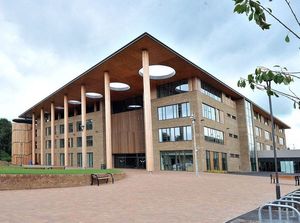Telford school taking 'effective action' over required improvements
A school is taking “effective action” to improve its rating after an unfavourable Ofsted report, an inspectors’ update says.

Haberdashers’ Abraham Darby, a 1,100-pupil mixed-sex secondary in Madeley, Telford, received good grades in two areas but “requires improvement” in three others and overall after its last full inspection in 2019.
The regulators’ report said pupils were achieving below their potential in mathematics, the curriculum for pupils with special needs was under-developed and some teachers set work that was too easy, not “challenging pupils to think deeply”.
Following a monitoring visit last month, Her Majesty’s Inspector Mark Howes acknowledges “positive signs” about the consistency of maths lessons and a newly-introduced behaviour policy, but says teachers need to check pupils’ understanding more thoroughly in class.
In a letter to Lee Hadley, the principal at the Ironbridge Road school, Mr Howes notes some “key appointments” have been made since the 2019 inspection, including a new vice-principal and two assistant VPs, and adds that all year groups, especially years eight and 10, “were affected by periods of self-isolation due to Covid-19”.
“Despite the disruption of the pandemic, you and your leadership team have maintained a focus on school improvement and have looked to address the areas of weakness identified at the previous inspection,” Mr Howes adds.
“Leaders have acted quickly to improve behaviour. A new behaviour policy that helps pupils to learn well was introduced in September 2020, which outlines key principles of effective behaviour.
“Leaders regularly review information about behaviour and identify and patterns or trends. Leaders also use a house-points system to reward positive behaviour.
“Staff have been trained to help implement this behaviour policy with greater consistency. Early indications suggest this is leading to improvements across the school."
He also notes improvements in the leadership around special educational needs and disabilities, the social, emotional and mental health hub and the teaching of religious education, English and mathematics.
Mr Howes – who was part of the four-member inspection team in 2019 – notes that an external provider helps the school develop its curriculum in the latter two subjects.
“You recognise that there is still more work to do to continue improvements to the curriculum,” he adds.
“In some subjects, pupils are not always clear about why they are completing certain tasks and are not able to make connections in what they are learning in order to deepen their understanding.
“Some teachers do not check pupils’ understanding effectively enough to ensure that misconceptions and errors are spotted quickly.”
He recommends to Mr Hadley that his team ensures teachers do this, and that they “help pupils make connection about what they are learning to deepen their understanding of the curriculum”.




